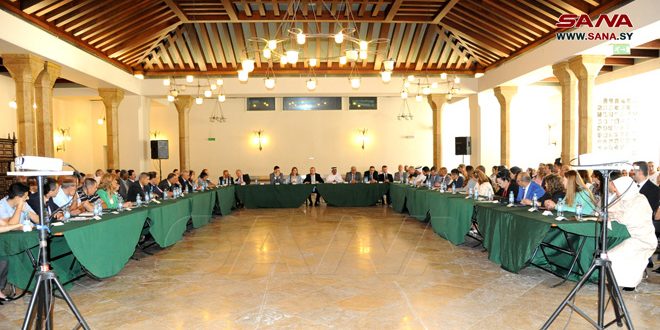Damascus (ST): Participants in the workshop held by the Ministry of Local Administration and Environment under the title (Climate Change in Syria, Reality and Challenges) discussed the impact of climate changes on Syria, in addition to Syria’s participation in global and regional efforts that aim at addressing the effects of these changes.
The participants in the workshop, which was held at the University of Damascus, called for expanding participation between all sectors and society in confronting the challenges posed by climate change, and creating an accurate database and a clear information bank, to reach all relevant parties and develop systematic maps showing the countries and regions that are exposed to climate change, in addition to enhancing youth awareness of climate issues, providing educational resources on climate change, encouraging environmental activities, and the role of civil society in awareness campaigns, support, guidance, and organizing joint events and projects.
The workshop included dialogue sessions that addressed several topics within the context of climate change, environment, agriculture, water resources, electricity, renewable energy, and the role of youth in this field.
Minister of Local Administration and Environment, Engineer Hussein Makhlouf, confirmed that Syria is one of the first countries which are committed to international agreements on environment protection and confronting climate change, and it is one of the founders and signatories of the agreements, which numbered 35 agreements. He pointed out that Syria has come a long way in the field of confronting climate change, as there are numerous programs, including the Law to Protect the Desert, Forests, and Wells and the Anti-Drought Fund to the Paris Climate Agreement. Syria has also made strides in the field of creating and protecting natural reserves, he added.
Engineer Makhlouf pointed out that the exploitation of the American and Turkish occupiers and their terrorist tools of the various resources in the areas they occupy, which led to primitive oil refining and cutting off water, affected biodiversity in Syria and caused harm to it. In addition, the unilateral coercive measures imposed by the West also led to depriving Syria of its needs in many areas, including energy, he calrified.
Chargé d’Affaires of the United Arab Emirates Embassy in Damascus, Counselor Abdul Hakim Al-Nuaimi, underlined the importance of Syria’s participation in the Conference of the Parties to the United Nations Framework Convention on Climate Change (COP28), which Dubai is hosting during the period extending from November 30 to December 12 of the year.
Assistant Minister of Agriculture and Agrarian Reform, Dr. Fayez Miqdad, affirmed that the unilateral coercive measures created difficulties in manufacturing and importing agricultural production requirements, and thus the volume of production, high costs, and food prices for the consumer.
In a statement to reporters, Dr. Darine Suleiman, President of the National Union of Syrian Students, underlined the importance of the workshop in producing integrated outcomes that reflect the importance of the role of youth in the field of climate change and its impact at the local and global levels. She also stressed the necessity of investing in the youth’s ideas and initiatives and employing them in this domain.
K.Q.

